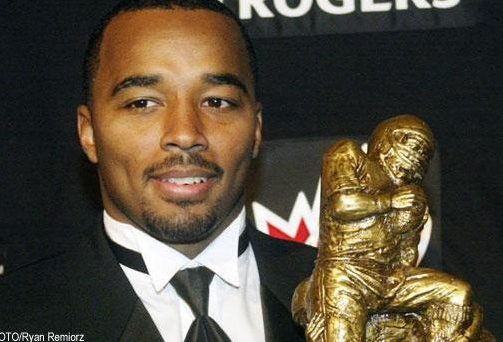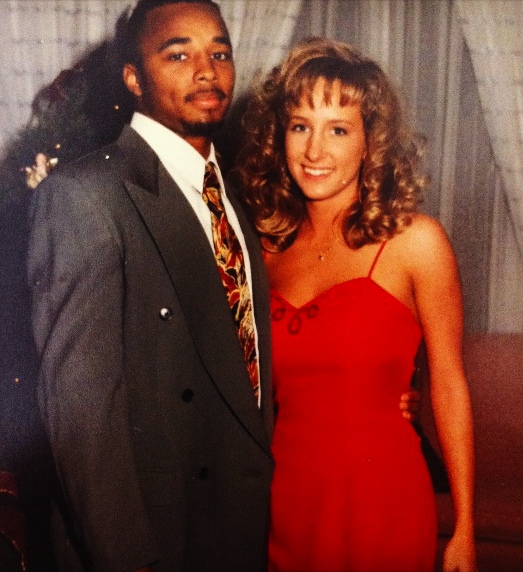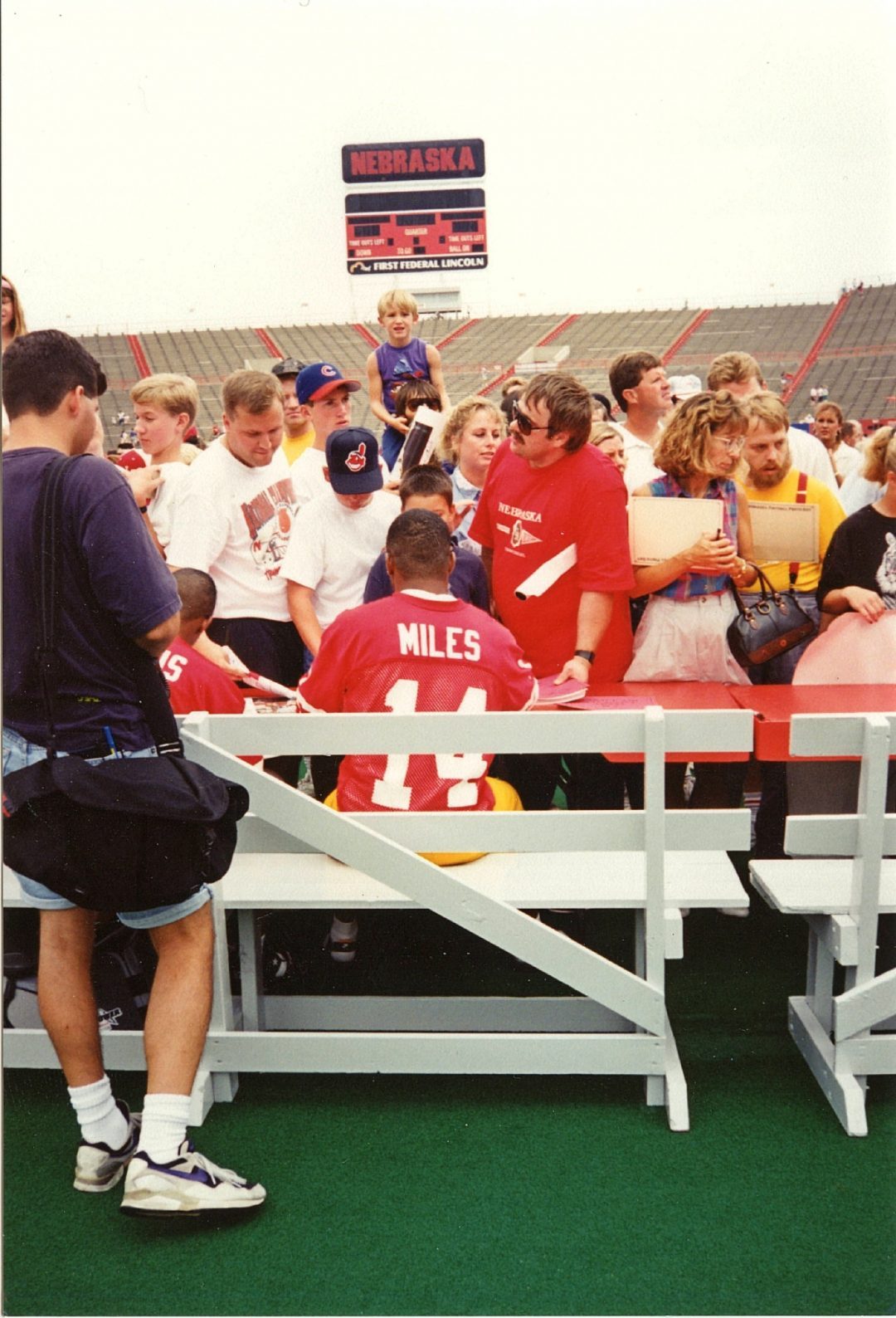Anatomy of an Era: Barron Miles, Part 4

Excerpted from Chapter 29, No Place Like Nebraska: Anatomy of an Era, Vol. 1 by Paul Koch
Barron Miles, Part 4
Q: Tell me about meeting your wife. A Nebraska girl from …?
BM: Schuyler. She was from Schuyler. I met her the first day of my math class my freshman year at 8 o’clock in the morning. My freshman year. She sat right next to me and I’d just talk to her every now and then. We were just friends and just showed up at class, and I’d see her and talk to her every now and then. And the middle of my sophomore year I had my own place and she was a DG -a Delta Gamma- and she stayed up the street about two blocks from me, and she just happened to be driving down the street and she saw me at the mailbox and she stopped. And from that point on it was history.
Q: I’m delving into a bit of a touchy subject here, but I remember when she joined the strength staff as a student assistant. Now, most folks reading this might not have known it, but Boyd had a rule that as student assistants we couldn’t date student/athletes. How was that for you, that whole situation?
BM: We were dating before she joined, I’m pretty sure. But I was so focused on what I had to do, it didn’t matter if she was there or not. Because no one knew, no one had a clue we were dating in the first place. To tell you the truth, no one had clue, even when she was there it wasn’t like I was hitting on her or talking to her or anything. It was, ‘I was there to work.’ And to this day I still don’t know how they knew, how it came out. I don’t know, but before that point no one knew, and you could tell when she was doing her job. It wasn’t a conflict.
Q: I know. To tell you the truth, that’s always been kind of a sore spot for me. I remember when she came on staff I was actually advising her in my office and tried to take her under my wing, so to speak, and I said, “Jen, this might sound like I’m your big brother, but you’re probably gonna have a lot of guys hitting on you. These guys really take a liking to pretty girls like you, like hungry sharks, and they’re probably not going to be too worried about weightlifting. So you be careful and professional and don’t get yourself in trouble, okay?’ And she was like “Yeah, okay, I understand.” And after the whole issue came to light (laughing) I felt so stupid because had I known you two were dating I could have saved my breath, you know? And then she had to leave the strength staff after it came to light, so that left a bad taste in my mouth.
BM: Yeah, and I’m trying to figure out how it happened. She may have even been honest and said something. And it was like a couple years that passed -one or two years- but the way it came out it was kind of wrong because Boyd knew me and knew who I was and what I was about: like if I was a goof-off in everything I did it could have been different. But when I came into the weight room I came in to work out, and when we did conditioning it was to work, you know? I wasn’t there to do anything else. Plus, we’d met before she even joined, so that was the kicker, you know?

Barron and Jennifer Miles (Jennifer Miles)
Q: I hear you. It was great to have Jen on staff for the time she was. Now tell me, is there someone behind the scenes who played a large role for you?
BM: Bailey. Yeah, Bryan Bailey and Randy Gobel. They came up with drills that fit us on the field. Those drills were so new, nobody else was doing them and they were coming up with these drills to perfect our craft. And no one else had a clue. I mean, the stuff we were doing, people are doing them now like they invented it, and Bryan and them were in there saying, “Let’s do this. This is what you do when you’re making a cut. This is what you do when you get hit and start to stumble. This is the position you’re gonna be in, so you have to be strong in this area.” Just crazy stuff, but yet, they showed video replays with us actually in those positions. It was so crazy. I don’t think they got enough credit. They were the nuts and bolts to that strength and conditioning staff.
Q: Anything you wish you could do over, Barron?
BM: Honestly, nope. I don’t think so. It was awesome, it was a great experience going to Nebraska. Meeting my wife, giving me three beautiful children, why would you want to change that? But the funniest thing, going back to Boyd and them, this is how bad I was: coming out of Roselle, New Jersey I didn’t lift weights. I only did curls and tricep pushdowns, because I was a quarterback and wanted to be able to throw. So I get there and test out, and I’m not just below average, but below the average of the average. It was bad. And Boyd was sitting there looking at me and he said, “This is terrible. You need to improve this, you need to improve that, you need to gain weight.” Then they send the report to Darlington and he sits me down in the office and he says, “You need to improve in this and that.”
And the next year it was the same thing, “You need to gain weight. You improved in this and you improved in that, but you need to gain weight.” And finally after the third year, they finally stopped and said, “You know what, you’re playing good. Just keep it up. Just keep doing what you’re doing. Don’t worry about it.” (laughs) I tell people to this day that I’ve been hearing it my whole life, “You’re too small, you’re too small. You need to get stronger, you need to do this.” It’s only natural, I couldn’t help it. I just couldn’t gain much weight. And some kids these days are like, “I need to gain some weight, get this big for them to look at me.” And I tell them, ‘No you don’t. You just need to be fast, be explosive, be smart, and just be able to play the game. They can work with everything else.’ I tell them, ‘If you’re that size and you can’t run now, how will you be able to run when you get bigger?’ And they say, “Yeah, but you got lucky. You went to a big school and all that.” I say, ‘So you thought it was easy for me? Hey, I went through it. I was 140 lbs. coming out of high school. What was so magical about that?’ (laughs) They just thought it was handed to me or something. It was, ‘No, you’ve got to work for it.’

Autograph day (Jill Deets)
Q: Any other descriptions of the culture?
BM: It‘s hard to explain. If you weren’t there, it’s hard to explain it. If you called a meeting for 3 o’clock, everybody knew that by 2:30 you were supposed to be there. Everyone knew come game time you were going to win. You didn’t have to say it, everybody knew it already, it was just by how many points. “How many points are we gonna win by?” We prepared hard enough, we stayed together, we played for each other. We could be down, losing in some game, but we’d be calm on the sidelines, knowing sooner or later we were going to blow these guys out. We didn’t panic. We just knew that we’d win and then go back to Lincoln and relax. It was never spoken, but everyone knew their job and their place, everybody knew their role and what they had to do. It was our time and we ran with it.
Q: What about the slogans?
BM: That was started right after the Florida State game…Unfinished Business. We left something on the field, we weren’t ready yet. Florida State was lucky we didn’t play them that next year. Miami, we still wanted to win and everything, but we wanted Florida State. They had to go lose to Miami or Boston College and messed it up that year, otherwise we’d have been playing Florida State. They got lucky. Redemption. That was the problem we had to fix.
Q: Do you recall going against any of the Florida State or Miami receivers?
BM: Kevin Knox tried to run his mouth, “You’re messing up my draft year. I’m about to get drafted on you.” He’s yapping at the mouth and I’m like, ‘You ain’t even gonna catch a ball. What are you talking about?’ He’s like, “I’m gonna school you all day.” And I’m saying, ‘Okay, we’ll see.’ And then he goes over to Tyrone Williams’ side and catches one or two and then comes back to me and says, “I’m killing your boy over there!” And I go, ‘Man, you haven’t even scored yet. What are you talking about?’ But other than that, Kez McCorvey, he was quiet, he didn’t do too much. The other Florida State guys didn’t say too much. The Miami guys were quiet, they were more tired than anything. They were subbing back and forth, and they were tired for the big game like that. Chris T. Jones, just nonchalant, run their routes and go. They relied on their defense. That was it. Everybody else was quiet.
Q: What was it like standing on the sidelines watching Miami’s defense get gassed?
BM: Actually, we really didn’t focus on their defense, it was just fun watching and expecting our offense to beat them, you know? Actually, I think their offense had negative yardage in the 4th quarter. It was like, “Alright, let’s just do our job and go. Let’s get the ball back.” And I’m trying to figure out, “Why are they so tired? We didn’t really sub that much. Why are they so tired?” But that’s why we won and they didn’t. That was the sign.
Q: You wanted it more?
BM: Exactly! All of us guys, even the receivers, ‘The Itty Bitty Committee.’ Us guys always had to fight.
End conversation.

Both volumes available on Amazon.com
“If there is no standard, what do you live up to?” Sometimes a person takes for granted the role tradition can play. At least I’m finding that out for myself in this quest for an answer to my great Why and How. Maybe because I’d grown up a Nebraska kid and just assumed every school, every state had its own provincial traditions and glories. The fact that this isn’t necessarily so is finally now beginning to strike a chord with me. By now we’ve heard a few times how important a role the traditionally televised Oklahoma/Nebraska game played in positioning Husker Football in the minds of so many kids nationwide, too. In those young minds was begotten the fact that Nebraska was a big time program who played in big time games. (Peculiar, but it seems it’s never mentioned whether Nebraska won or lost those OU games, only that they were a participant.) Maybe it didn’t matter to the fans whose existence lay outside the state boundaries of ‘The Good Life.’
And speaking of fans, I think it’s important to make the distinction between fan attendance and fan support. “The fans’ commitment to Nebraska football set us apart from everybody. Nobody does it like that.” You could fill Memorial Stadium to overflowing, as many of these guys attest to their amazement, but what I believe is inferred is that these same fans contributed by their actual lack of negativism via booing, belligerence and other bawdy behaviors. Sure, there was a sourpuss here and there and a spare drunk now and then blowing his top and spewing forth verbal sewage, but for the most part Nebraska fans in that period were respectful regarding the home team as well as the visitors. In their eyes, the gameday experience seemed to be more about the action, the effort, the goal rather than an opportunity to abuse their collective voice and demean, degrade or disparage. Memorial Stadium was full of cheer and good will for the most part, which made every Saturday seem a bit like Christmas. Especially with all those big guys wearing red.
A part of that standard, the tradition being passed down from one year to the next, was Barron’s mention of defensive back Tyrone Legette from Columbia, South Carolina, a few years older than he. To have an upperclassman bound for the pros thrust forward a challenge, a dare of sorts, to break his own personal athletic performance records, that speaks to the role that legacy played for these guys. You always hear the term ‘took me under their wings,’ an idiom meaning care and nurture of someone less experienced, and that brotherly oversight and goodwill grew exponentially under the like-kind leadership of Coach/Coordinators Tom Osborne and Charlie McBride and all of the other position coaches, even the aforementioned LB Coach Kevin Steele, to a certain degree. (We’ll hear more about Coach Steele when we talk to the linebackers later on)
Barron then mentioned the word ‘redemption.’ Perhaps that ties in to the concept of revenge, but it appears that winning that first national championship was about more than just winning that first national championship for these guys. Instead it was about proving to both themselves and the naysayers that the previous year was an anomaly, a mistake, and that they had come to right some wrongs and change perceptions, almost to the point of making the crowning of the new kings of college football an afterthought.
To finish here, I was surprised by the mention of the scout team’s suiting up in the coming week’s opposition’s colors. Even I didn’t know about that. As the season plods along practices can often become monotonous and perfunctory, so someone somewhere along the line decided to spice things up by providing a true visual representation of the ‘bad guys’ via decidedly un-Husker practice garb. I wonder if doing so might have given the top teams on the depth chart a mental edge and a sense of familiarity come Saturday, somehow lessening inhibitions and mental blocks because of the newfound normality of the presence of opponents’ uniforms in their midst. Maybe that’s me reaching for something above and beyond the intent of this practice ploy, but then again, perfect records would appear to back up my theory as having a potential cause and effect relationship during that period. It’s hard to argue against 60 & 3.
Notable quote #2:
Barron Miles on the shared mentality of Nebraska Football: “Everyone knew come game time you were going to win. You didn’t have to say it, everybody knew it already. It was just by how many points.”
Copyright @ 2013 Thermopylae Press. All Rights Reserved.
Photo Credits : Unknown Original Sources/Updates Welcomed
Paul Koch